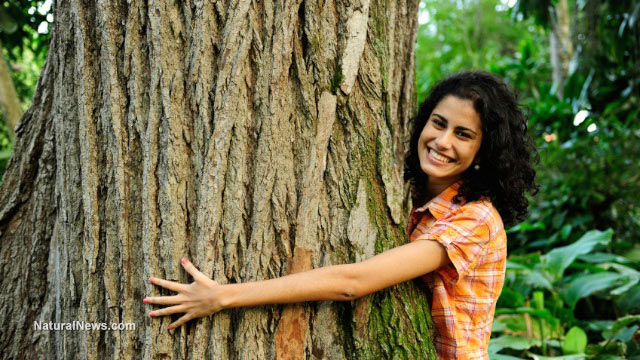Seed-infused plantable coffee cups offer a sustainable solution to America's throwaway culture
Wednesday, July 22, 2015 by: P.A. Watson
Tags: plantable cups, recycling, coffee waste

- Newly released JFK files reveal Pentagon's role in creating Lyme disease and covid in the same lab
- Ginseng's hidden anti-aging power: How compound K is rewriting the rules of skincare
- “Endgame: The Hidden Agenda 21” unveils a world of conspiracy and control
- L.A.'s rebuilding nightmare: Only 4 permits issued after fire destroys 6,000 homes
- Scientists demand FDA withdraw mRNA COVID vaccines amid contamination and gene therapy concerns
- Senate Democrats deny censorship industrial complex existed, defend government's role in silencing dissent
- Dr. Suzanne Humphries makes bombshell appearance on Joe Rogan podcast, exposing vaccine industry deception back to POLIOMYELITIS
- Former Congresswoman exposes CCP's deep infiltration of California through universities, ports, and fentanyl
- “The shame of Minnesota”: Somali immigrants behind $250 million child nutrition fraud in largest COVID-era scam
- PROCESSED TABLE SALT in foods found to fuel depression
- Despite surge in MMR vaccination in Texas, measles outbreaks continue: Is VACCINE SHEDDING fueling the spread?
- “Independent” anti-Russia outlet MEDUZA faces COLLAPSE as US funding dries up
- Here are TEN all-natural ways to protect your garden without using harmful chemicals
- BPA: The hidden hormone disruptor sabotaging your health - and how to fight back
- Chewing gum's dirty secret: How your daily habit could be flooding your body with microplastics
- The hidden battle in your glass: How A1 and A2 milk could shape your health
- Catastrophic 7.7 earthquake devastates Myanmar and Thailand; death toll could reach 100,000
- Discovery of vast underground city beneath Giza pyramids challenges human history
- Newly released JFK files reveal Pentagon's role in creating Lyme disease and covid in the same lab
- Analysis: The coming economic collapse, a mass uprising and Trump's three secret weapons to halt the growing revolt
- Festive flavors: The sweet history, nutritional profile and health benefits of pecan pie
- Elon Musk: Aliens could be here on Earth RIGHT NOW
- Trump reverses course on Gaza plan, says “nobody is expelling Palestinians”
- Big Pharma's $8 Billion bribery scheme exposed: how doctors are pushed to prescribe junk science, not heal
- Boys are back in town: Trump’s patriotic alpha crew takes the wheel while toxic females ride in the backseat
- Reclaim your health: How midlife exercise reverses years of inactivity
- A lack of integrity in Academia: Harvard professor found GUILTY of fraudulent research to promote CRT theory
- Survival 101: Effective EMF blocking techniques
- EPA advisor admits the agency is funneling billions to climate groups ahead of Trump’s return to White House
- Dr. Mike Yeadon releases 15-minute testimony - WATCH - about genocidal intent of COVID “vaccines”
- 5 Simple steps to boost your brainpower: How to strengthen executive function in a distracted world
- Florida takes a stand: DeSantis proposes permanent ban on mRNA vaccine mandates
- Sugarcane extract superior to cholesterol-lowering drugs?
- Mike Adams Sermon 66: God will DESTROY ISRAEL for its wickedness
- Pilots report mysterious lights 'moving at extreme speeds' across Oregon skies
- Space war brewing? Russia threatens to destroy Starlink satellites
- EPA advisor admits the agency is funneling billions to climate groups ahead of Trump’s return to White House
- California's social media censorship law struck down: A victory for free speech or a threat to online safety?
- The Health Ranger releases “Vaccine Zombie” song and music video, using AI-animated zombies for the music video
- Dr. Mike Yeadon releases 15-minute testimony - WATCH - about genocidal intent of COVID “vaccines”
- The pandemic as a tool for INDOCTRINATION: Understanding “The Indoctrinated Brain” by Dr. Michael Nehls
- Newly released JFK files reveal Pentagon's role in creating Lyme disease and covid in the same lab
- Florida takes a stand: DeSantis proposes permanent ban on mRNA vaccine mandates
- Mike Adams releases country western hit single: Goin’ Back in Time is Comin’ Home
- Mike Adams releases music poetry sensation: A Child of God
- “Why we influenced the 2020 elections”: Facebook files reveal the coordinated effort to bury the Hunter Biden laptop story
- Unpacking the Lies That We’ve Been Fed – new song and music video released by Mike Adams, the Health Ranger
- RFK Jr. clears key hurdle: Sen. Susan Collins backs controversial HHS nominee, signaling a new era for health policy
- Mike Adams releases new song and music video: Nothing More Disgusting Than a Globalist
- Michigan sheriff announces criminal investigation into 2020 election crimes, Dominion Voting Systems
- Israeli soldiers accused of even more torture and abuse in the West Bank
- Migrants are taking advantage of recent hurricanes to scam residents and loot their homes
- House Intelligence Committee calls for the ARREST and PROSECUTION of Dr. Anthony Fauci
- Rep. Nancy Mace introduces bill to ban biological males from female facilities on federal property
- Red Cross issues warning to stop blood plasma donations from vaccinated people
- Scientists confirm: GENIUS brain function can be spontaneously unleashed in humans without any apparent cause
- EPA advisor admits the agency is funneling billions to climate groups ahead of Trump’s return to White House
- HYSSOP: What research reveals about the health benefits of this ancient holy herb
- Two containers with completed ballots fall out of truck in Florida
- Fully vaccinated about to see “tsunami” of illness and death, warns virologist
- Global leaders unite to clamp down on “misinformation” with UN-backed Cascais Declaration
- BREAKING: 2025 NDAA authorizes mandatory military draft of WOMEN across America… as Pentagon pursues global NUCLEAR war with both Russia and China at the same time
- Michael Yon warns of a ZIONIST TAKEOVER in Trump’s second administration
- BOMBSHELL: DNA testing kits are a SCAM to develop ethnic-specific bioweapons
- Ozempic and Wegovy weight loss drugs are injectable LIZARD VENOM PEPTIDES that may unleash a devastating wave of organ failure… side effects align with symptoms of SNAKE BITES
- Israeli soldiers accused of even more torture and abuse in the West Bank
- These 13 countries just signed an agreement to engineer a global FAMINE by destroying food supply
- NASA admits that climate change occurs because of changes in Earth’s solar orbit, and NOT because of SUVs and fossil fuels
- RFK Jr. clears key hurdle: Sen. Susan Collins backs controversial HHS nominee, signaling a new era for health policy
- Sermon 30: How Jesus reveals Caesar’s FAKE CURRENCY and FALSE AUTHORITY
- Coriander seeds: Ancient medicine backed by modern science
- Arizona officials claim Maricopa County needs 10-13 days to tabulate results of the election
With over 400 million cups of coffee being consumed each day in America, this Earth-friendly company decided to trump the recycling industry by allowing consumers to not just recycle their cups but turn their daily cup of java into a tree.
The concept is a plantable cup that embeds native seeds into the compostable cardboard cup lining. At the moment, they only contain California seeds, but as their campaign rolls out, each region will have their own plantable cups embedded with seeds native to their region, including Colorado, which is already on their hit list of locations.
The concept is nearly foolproof given the hardy seeds currently being used, and the easy three-step process to plant your own tree. Simply unravel the cup, soak in water for five minutes, then plant and let it grow! The coffee cup can biodegrade within 180 days, and transforms into native flowers and trees.
For those who are not inclined to do so or are not in a region where planting trees is amenable, they can simply dispose of the cups in a special recycling receptacle that will then allow Reduce. Reuse. Grow. or another third party to redistribute and plant the cups in desired locations. The consumer can even see where their cup was planted and what types of seeds were used to rejuvenate their landscapes.
To get an idea of the potential impact of this idea, consider that one throw-away cup produces 35g of CO2 released into the atmosphere with a life of over five years. With this campaign, that cup could instead grow one tree, which can extract one ton of CO2 over a 40-year span. So instead of just neutralizing the impact through recycling, you can now make a positive imprint on the planet.
It's also important to note that testing has been done with a handful of seeds native to California to see if there were any issues related to coffee heat on the seeds embedded into the lining. Since the seeds were not coming into contact with the coffee itself, and the liner as well as the paper absorbs a lot of the heat, the seeds are not directly affected and they have had no problem with germination.
To date, 140,000 containers have been planted, and with the project already blazing past its Kickstarter goal of $10,000 and currently at $21,077, it's possible that you may see this plantable coffee cup in your local coffee shop, at least in California. Provided the project continues with its success, this could expand to other states as well. The company claims that the biodegradable cup costs as much as any other (about $0.02 per cup) and not much more than a typical Solo-brand non-recyclable cup ($0.01). With such a low investment and positive impact, these plantable cups should be an obvious solution to flourishing coffee shops across the country.
If all goes as planned, plantable coffee cups that can turn into trees will be a reality by this summer. If it goes well, this type of product can also be manufactured into to-go containers, corrugated cardboard boxes, bio plastic and paper products that create trees, rather than pollutants that destroy trees!
If you'd like to learn more about this Earth-friendly project, check out the website of Reduce. Reuse. Grow. here.
Sources:
http://modernfarmer.com
http://www.boredpanda.com
http://www.planttrash.com
https://www.kickstarter.com
http://www.e-importz.com
Plantable cups at FETCH.news
Get independent news alerts on natural cures, food lab tests, cannabis medicine, science, robotics, drones, privacy and more.
Take Action: Support Natural News by linking to this article from your website
Permalink to this article:
Embed article link: (copy HTML code below):
Reprinting this article:
Non-commercial use OK, cite NaturalNews.com with clickable link.
Follow Natural News on Facebook, Twitter, Google Plus, and Pinterest
Science News & Studies
Medicine News and Information
Food News & Studies
Health News & Studies
Herbs News & Information
Pollution News & Studies
Cancer News & Studies
Climate News & Studies
Survival News & Information
Gear News & Information
News covering technology, stocks, hackers, and more



"Big Tech and mainstream media are constantly trying to silence the independent voices that dare to bring you the truth about toxic food ingredients, dangerous medications and the failed, fraudulent science of the profit-driven medical establishment.
Email is one of the best ways to make sure you stay informed, without the censorship of the tech giants (Google, Apple, Facebook, Twitter, YouTube, etc.). Stay informed and you'll even likely learn information that may help save your own life."
–The Health Ranger, Mike Adams













































